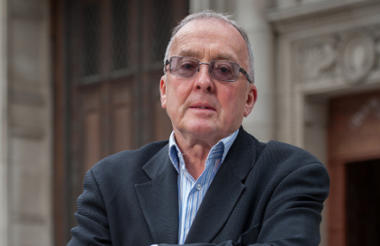Charities should not be driven by opinion polls on their trustworthiness, but by whether they believe they are doing a good job for their beneficiaries, Sir Stephen Bubb said yesterday at the Conservative Party Conference.
Bubb, the former chief executive of Acevo – which hosted the fringe session - was criticising the use of public polling generally, a practice that many sector organisations use.
He said that charity has been around long before polling and that charities should be acting in a certain way because they want to, not because the polls tell them they should.
He said of the Charity Commission’s poll on public trust: “The Charity Commission wasting money by asking people if they think charity is still relevant. Well how ludicrous. You’d think they’d have better things to do.”
Bubb was speaking on the panel, which was chaired by Ralph Scott, head of citizenship at Demos, alongside Joe Twyman, head of political and social research at YouGov, and Vicky McDermott, chief executive of Papworth Trust. The fringe session was based on the question “Can modern charities be trusted?”
In response to Bubb's comments, a Charity Commission spokesman told Civil Society News: "One of the Commission’s key objectives is to increase public trust and confidence in charities. Our long running research into the public’s trust and confidence in charities is a valuable barometer of public opinion which is valued by the sector.
"We have worked closely with a number of sector bodies and charity leaders to discuss the results of our research in recent weeks and we are pleased at the positive steps that charities are taking to address these key issues.”
Speaking of some of the oldest running charities, some being established as early as the 6th Century, Bubb said that “we sometimes forget that this country has an amazing and very proud charity tradition”.
He said that charities that “marry real campaigning and advocacy zeal with practical support and services” encapsulates what charity is about for him.
Bubb said: “And if we are controversial, that is a good thing, and I hope that we will never become obsessed like politicians are with polls and surveys. If Joe had been around at the time of Queen Elizabeth I, I suspect if he had done a survey he would have found an alarming lack of trust in charities. I think let’s keep a little perspective shall we.”
Bubb said that he is not “suggesting that we should not look at how we can do things better”, and said that “the golden rule of charity funding that if you don’t invest in the back office of a charity, if you don’t pay professionals properly then you will not deliver effectively on the front line”.
He added: “Perhaps it is because I am a chief executive who is known for never being much into detail that I don’t pay much attention to Joe’s surveys, but I think we really do need to keep a grip on just how incredible this country is in its charity tradition. And to sing that aloud. It is probably the world’s greatest civil society tradition, and that is something we should be proud of. Let’s stop knocking it. Let’s in our own sector, stop beating ourselves up, because what we do is pretty wonderful.”
Charities' work should not be driven by polls
Bubb said that charities paid too much attention to polls run by people such as his fellow panellist from YouGov.
He said that what charities do “What charities do shouldn’t be driven by people like Joe and his YouGov polls”, but that “we should be doing it because if we want to run really effective organisations, we need good governance and leadership.
“But sometimes that means we have got to ignore some of the polling, because if you ask people ‘should charity chief executives be paid?’ let alone be paid £100k, people would say no because people have the idea that charities should be entirely run by volunteers.
“We have got to be clear about the need for good governance and good leadership. Sometimes instead of beating ourselves up and saying Joe’s figures are so awful, we just need to think what is it that we need to be doing and just doing it. Not because of a poll, but because we want to run effective organisations.”
In response to Bubb’s comments, Scott said that “part of trying to gage public opinion is that charities are seeking to raise funds from the public. If public opinion turns against charities it could have a financial impact in the short and long term.”
Twyman responded to Bubb’s comments on polling saying that “obviously there are limits to the polling. But if the polling tells you that the public think chief execs get paid too much, then that is an issue that is going to affect various aspects of your business including your fundraising”. He added that “this poll informs your opinion, so when you go out and talk about chief executive pay, for example, you can make a justification of why they are paid that much”.
McDermott said she disagreed slightly with Stephen. She said: “I do think it is important what the public think. Fundraising is part of it, but actually charities have to exist as part of society, as part of civil society, so therefore we have to exist within a context.”
Charity Commission experience
A member of the audience asked the question of the panel of what qualifies the Charity Commission to be asking questions of trust, of which Bubb responded by saying: “It is actually shocking that the Charity Commission has so few people on the Commission that know anything or have any experience of charities. It is pretty bloody awful.”









